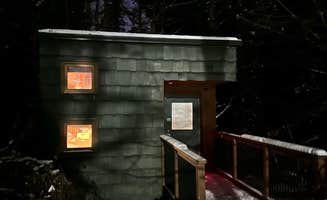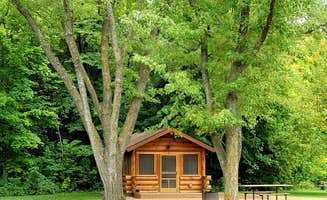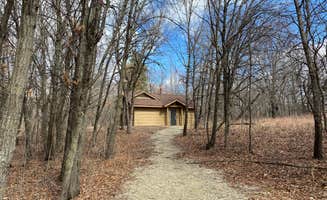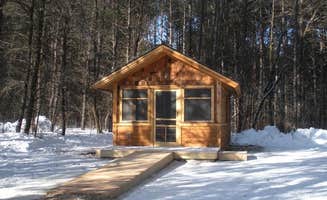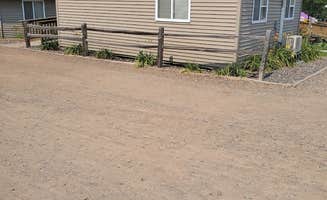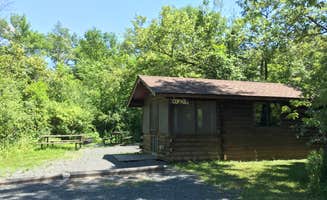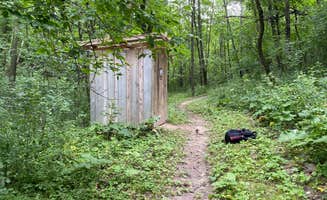Cabin accommodations near Richfield range from basic to deluxe structures with specific seasonal limitations. Located in Minnesota's deciduous forest region at 840 feet elevation, these cabins experience full seasonal extremes with winter temperatures regularly dropping below freezing. Most cabin sites remain open from April through October, though some properties like William O'Brien State Park maintain year-round cabin availability with heating systems.
What to do
Night hiking trails: 11 miles available at Afton State Park with varying terrain and elevation changes. The park features both prairie and wooded landscapes suitable for evening exploration. "We hiked 11 miles here and it was awesome!" notes one visitor, though seasonal water access can be limited.
Winter cabin stays: Heat included at many locations with some requiring advance preparation. The cabins at Whitetail Woods Camper Cabins offer specific winter amenities with important limitations. "The cabins are well-built and heated. The wooded cabins have what seems like full-sized mattress bunk beds built into the wall. Each bunk has its own reading light," reports one winter camper who also notes bathroom considerations: "There are two year round showers as well, but don't plan on a long shower to unwind unless you like cold water."
Biking routes: 6+ mile trail system at Baker Campground with connections to wider trail networks. "There is a nice 6+mile biking trail that connects to others, so bring the bikes," suggests one regular visitor. The paved paths accommodate family riding with varying terrain difficulty levels.
What campers like
Privacy options: Tent-specific areas available at Rice Creek Campgrounds with quieter surroundings. "The fact that this loop (F LOOP) was 'tent only' meant no generators! It was very quiet!" writes one camper, who appreciated the layout: "I couldn't see any neighbor on the one side where there was a campsite (the other was a field...which is why I chose it)."
Shower facilities: Clean and modern at most developed cabin sites with varying hot water availability. "The bathroom facilities are nice. Outside water is shut off during some parts of the year, so bring your own drinking water if you are camping close to/during winter," warns a Whitetail Woods visitor. Shower buildings generally include separate changing areas.
Group accommodations: Dedicated spaces at St. Croix Bluffs Regional Park accommodate larger gatherings with specialized amenities. "This place has two group sites the one we stayed at Birch Hollow, hosts up to 20 campers and the other one up to 50. Our site has a large picnic shelter with 6 picnic tables two grills and it's own volleyball place," details one group leader who valued the designated facilities.
What you should know
Weekend availability: Reserve early for peak times across all cabin properties. According to a camper at Whitetail Woods: "It's difficult to get reservations, so I recommend trying to start booking 120 days in advance, which is the farthest out you can reserve." Most cabins can be booked through respective county or state reservation systems.
Cooking restrictions: Different rules by property with some allowing indoor electric appliances. "You can use a slow cooker and a coffee pot in the cabin. Otherwise you can cook over the fire as well," mentions a Whitetail Woods visitor regarding specific equipment allowed. Some properties prohibit all indoor cooking.
Alcohol policies: Rules vary significantly between Bunker Hills Regional Park (permitted) and other locations. One camper at St. Croix Bluffs specifically notes restrictions: "Another downside is YOU CANT BRING ALCOHOL OR PETS!" Park staff regularly monitor for compliance with posted rules.
Tips for camping with families
Beach access: Multiple swimming options near cabin sites with designated areas. "The beach was very nice to swim in, but was a bit crowded no surprise in mid July," reports a St. Croix Bluffs visitor. Water quality monitoring occurs regularly at most swimming locations.
Activity variety: Playgrounds and trails provide options for different age groups. At Baker Park Reserve, "With great fishing, playground, swimming, and biking trails very nearby, the kids were kept as busy as they wanted to be," according to one family camper who appreciated the range of options.
Safety features: Wildlife awareness needed even at developed cabin sites. "Apparently there had been some bear sightings when we went, be ware of the bears I guess. We didn't spot any on the trail but we did get visited by raccoons both nights," warns a St. Croix Bluffs camper regarding food storage needs.
Tips from RVers
Electric hookups: 30-amp service standard at most developed locations with dedicated RV sites. At William O'Brien State Park, "the sites are very close in there and were small," according to a recent visitor. Electric service generally supports basic heating and cooling needs.
Dump station access: Limited hours at some properties requiring planning for longer stays. Water fill stations remain more readily available with one Minneapolis Northwest KOA visitor noting, "Water fill stations readily available so we loaded up prior to continuing out west."
Site selection: Call ahead for specific needs as algorithms may determine initial assignments. "When I asked the owner for another site, he told me they were all taken except for one without a sewer connection. I asked why I was given such an undesirable site when I booked so far in advance and he told me that there is an algorithm that determines the site selection," explains one camper who recommends specific requests.


